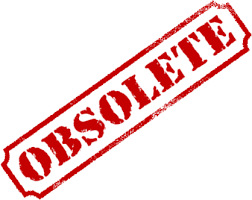obsolete
英 [ˌɒb.səlˈiːt]
美 [ˌɑːb.səlˈiːt]
- adj. 废弃的;老式的
- n. 废词;陈腐的人
- vt. 淘汰;废弃
使用频率:

记忆方法
记忆“obsolete”可以将其分解为“ob”和“solete”。联想“ob”为“阻挡”或“不”,意味着这个状态是阻止或不再使用的。而“solete”可以想象为“石头上的旧”,象征着某个东西如石头上的文字一样,已经过时不再使用。通过这样的联想,可以记忆为“已过时的,不再使用的”。
以上内容由AI生成, 仅供参考和借鉴
中文词源
obsolete 过时的,陈旧的
来自obsolescent,过时的,陈旧的。
英语词源
- obsolete (adj.)
- 1570s, from Latin obsoletus "grown old, worn out," past participle of obsolescere "fall into disuse," probably from ob "away" (see ob-) + an expanded form of solere "to be used to, be accustomed" (see insolent).
权威例句
- 1. With technological changes many traditional skills have become obsolete.
- 随着技术的革新,许多传统技艺已被淘汰。
- 2. These goods are obsolete and will not fetch much on the market.
- 这些货品过时了,在市场上卖不了高价.
- 3. Our service is obsolete, requiring root and branch reform.
- 我们的服务业已过时, 需要彻底改革.
- 4. They tried to hammer obsolete ideas into the young people's heads.
- 他们竭力把陈旧思想灌输给青年.
- 5. There ought to be a note on this obsolete word.
- 这个过时的词应有注释.